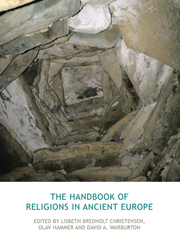Book contents
- Frontmatter
- Contents
- A note on Greek and Latin sources
- Abbreviations and short titles
- 1 Introduction
- PART I PREHISTORIC RELIGIONS
- PART II ANCIENT EUROPE IN THE HISTORICAL PERIOD
- 12 Minoan and Mycenaean religion
- 13 Etruscan religion
- 14 The religions of the Iberian Peninsula
- 15 Italic religion
- 16 Roman religion
- 17 Ancient Greek religion
- 18 The Graeco-Roman cult of Isis
- 19 The cult of Mithras
- 20 Religious Platonism: philosophy and religion in the Platonic tradition
- 21 Insular Celtic religion
- 22 Continental Germanic religion
- 23 Pre-Christian Anglo-Saxon religion
- 24 Old Norse religion
- 25 Slavic religion
- 26 Baltic religion
- 27 Religion in prehistoric Finland
- 28 Sami religion
- Timeline of key dates
- Contributors
- References
- Index
20 - Religious Platonism: philosophy and religion in the Platonic tradition
from PART II - ANCIENT EUROPE IN THE HISTORICAL PERIOD
- Frontmatter
- Contents
- A note on Greek and Latin sources
- Abbreviations and short titles
- 1 Introduction
- PART I PREHISTORIC RELIGIONS
- PART II ANCIENT EUROPE IN THE HISTORICAL PERIOD
- 12 Minoan and Mycenaean religion
- 13 Etruscan religion
- 14 The religions of the Iberian Peninsula
- 15 Italic religion
- 16 Roman religion
- 17 Ancient Greek religion
- 18 The Graeco-Roman cult of Isis
- 19 The cult of Mithras
- 20 Religious Platonism: philosophy and religion in the Platonic tradition
- 21 Insular Celtic religion
- 22 Continental Germanic religion
- 23 Pre-Christian Anglo-Saxon religion
- 24 Old Norse religion
- 25 Slavic religion
- 26 Baltic religion
- 27 Religion in prehistoric Finland
- 28 Sami religion
- Timeline of key dates
- Contributors
- References
- Index
Summary
RETHINKING THE RELATION BETWEEN PHILOSOPHY AND RELIGION
How is one to think of the relation between philosophy and religion in the Platonic tradition? The phrase “religious Platonism” may seem to be an oxymoron, if one defines Platonism, after Nietzsche, as primarily a philosophical or intellectual enterprise, fixated on “reason” and practised by a rationalist elite; or if one defines religion, by contrast, as a set of common beliefs and practices, involving prayers, rituals and accepted procedures, either more or less irrational or possessing their own peculiar traditional roots shared by a specific group of people. Platonism, more broadly conceived, however, resists modern categories, for it is an “in-between” phenomenon that cuts across modern disciplinary and dichotomous notions such as “religion” and “philosophy” as well as across ancient traditionalist representations of divinity (such as the Greek gods), of city-state or nation-hood. Religion is a term derived from Latin with no exact Greek equivalent and for this reason one might claim that there is no notion of religion as such in Greek antiquity. Even for Pseudo-Dionysius, a Christian “Platonist” of the fifth-sixth centuries CE, the approximate terms for our notion of religion, namely threskeia (worship), theologia (theology), hierourgia (holy work), leitourgia (liturgy), theourgia (theurgy), agathourgia, involve a “theology” of lived experience that does not separate philosophy, practice, prayer and community. Equally, neither Plato in the fourth century BCE nor Dionysius in the sixth century CE divides life up into its various domains (social, political, philosophical, etc.)
- Type
- Chapter
- Information
- The Handbook of Religions in Ancient Europe , pp. 263 - 277Publisher: Acumen PublishingPrint publication year: 2013



